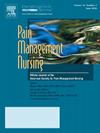腹腔镜胆囊切除术患者术前患者自控镇痛教育计划(Smart Learning)的效果。
IF 1.6
4区 医学
Q2 NURSING
引用次数: 0
摘要
背景:接受腹腔镜胆囊切除术的患者会出现严重的术后疼痛,而且这种急性疼痛往往会转变为慢性疼痛:本研究通过对腹腔镜胆囊切除术后使用患者自控镇痛(PCA)的患者进行智能学习,确定术前教育对患者自控镇痛(PCA)的影响:我们进行了一项采用非等效对照组前测-后测设计的准实验研究:韩国一家医院共收治了60名20-65岁的腹腔镜胆囊切除术成年患者,他们参加了智能学习培训项目:本研究采用了智能学习的概念,即利用智能手机和媒体平板电脑等移动设备将学习内容和解决方案与第四次工业革命相结合。该智能学习培训计划包括三个阶段:(1)汇报前,患者通过研究人员创建的程序获取PCA知识,并可使用移动网络设备(如智能手机或iPad)访问,培训内容包括疼痛特征、PCA效果、注意事项和使用方法;(2)模拟,患者学习使用机器进行PCA;(3)汇报,患者回顾自己的知识和技能:比较实验组和对照组的疼痛情况,实验组(Z = -4.40,p < .001)和对照组(Z = -4.41,p < .001)的疼痛均明显减轻,组间无显著差异(Z = -1.00,p = .319)。实验组(Z = -4.74,p < .001)和对照组(Z = -3.55,p < .001)的术前知识都有明显增加,组间差异显著(Z = -6.05,p < .001)。实验组对疼痛控制的总满意度高于对照组:结论:关于 PCA 使用的结构化教育计划是一种有效的护理干预措施。采用智能学习的PCA教育项目可帮助接受腹腔镜胆囊切除术的患者了解术后疼痛,促进PCA的有效使用,并提高他们对疼痛控制的满意度。本文章由计算机程序翻译,如有差异,请以英文原文为准。
Effects of a Preoperative Patient-Controlled Analgesia Education Program Using Smart Learning in Laparoscopic Cholecystectomy Patients
Background
Patients undergoing laparoscopic cholecystectomy develop severe postoperative pain, and this acute pain often becomes chronic.
Objectives
This study determines the effects of preoperative education on patient-controlled analgesia (PCA) through smart learning in patients using PCA after undergoing laparoscopic cholecystectomies.
Design
We conducted a quasi-experimental study with a nonequivalent control group pretest–posttest design.
Participants
A total of 60 adult patients aged 20-65 years, admitted for laparoscopic cholecystectomy at a hospital in Korea, participated in a smart learning training program.
Methods
The concept of smart learning, which integrates learning content and solutions with the fourth industrial revolution using mobile devices such as smartphones and media tablets was applied in this study. This smart learning training program comprised three phases: (1) prebriefing, where patients accessed PCA knowledge via a program created by researchers and accessible using a mobile web device (e.g., smartphone or an iPad), with training covering pain characteristics, PCA effects, precautions, and usage methods; (2) simulation, where patients learned using PCA with a machine; (3) debriefing, where patients reviewed their knowledge and skills.
Results
Comparing the pain between the experimental and control groups, the pain decreased significantly in both the experimental (Z = –4.40, p < .001) and control groups (Z = –4.41, p < .001), with no significant difference between groups (Z = –1.00, p = .319). Preoperative knowledge significantly increased in both the experimental (Z = –4.74, p < .001) and control groups (Z = –3.55, p < .001), with a significant difference between groups (Z = –6.05, p < .001). Total satisfaction with pain control was higher in the experimental group than in the control group.
Conclusions
A structured educational program on PCA use is an effective nursing intervention. PCA educational programs using smart learning could help patients undergoing laparoscopic cholecystectomy understand postoperative pain, promote efficient PCA use, and enhance their satisfaction with pain control.
求助全文
通过发布文献求助,成功后即可免费获取论文全文。
去求助
来源期刊

Pain Management Nursing
医学-护理
CiteScore
3.00
自引率
5.90%
发文量
187
审稿时长
>12 weeks
期刊介绍:
This peer-reviewed journal offers a unique focus on the realm of pain management as it applies to nursing. Original and review articles from experts in the field offer key insights in the areas of clinical practice, advocacy, education, administration, and research. Additional features include practice guidelines and pharmacology updates.
 求助内容:
求助内容: 应助结果提醒方式:
应助结果提醒方式:


